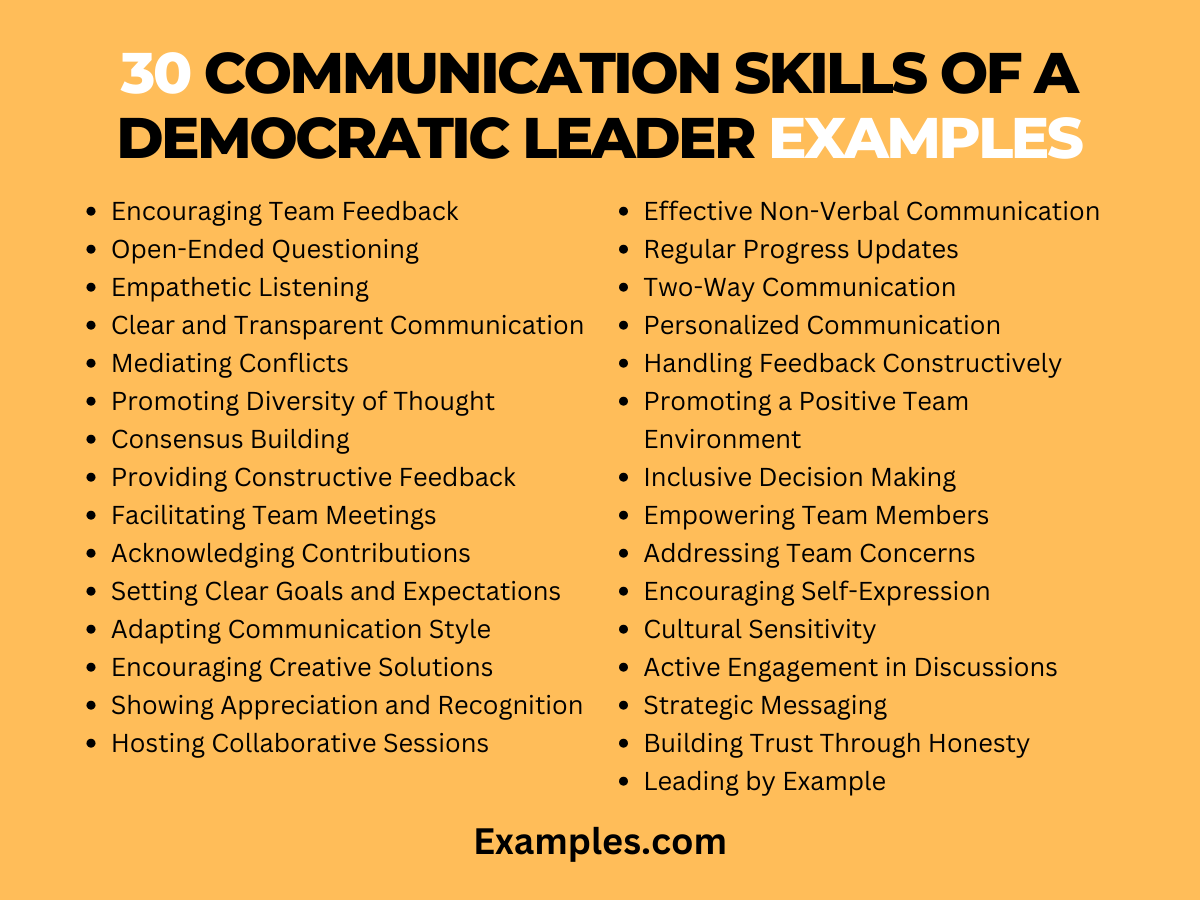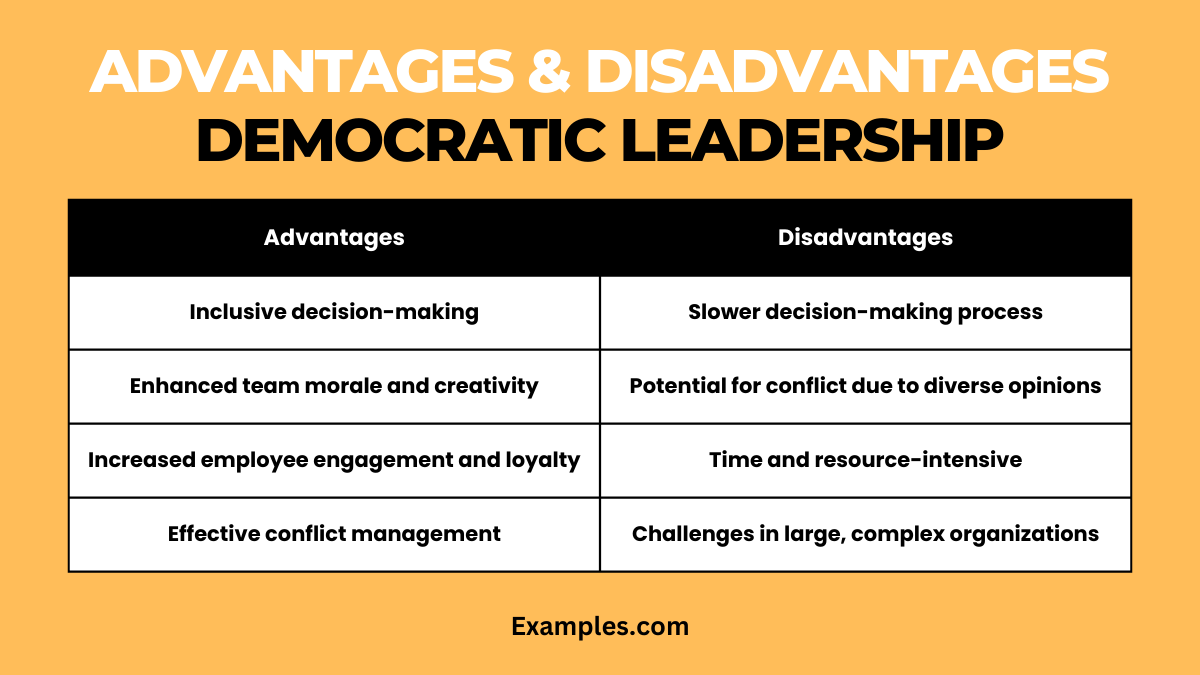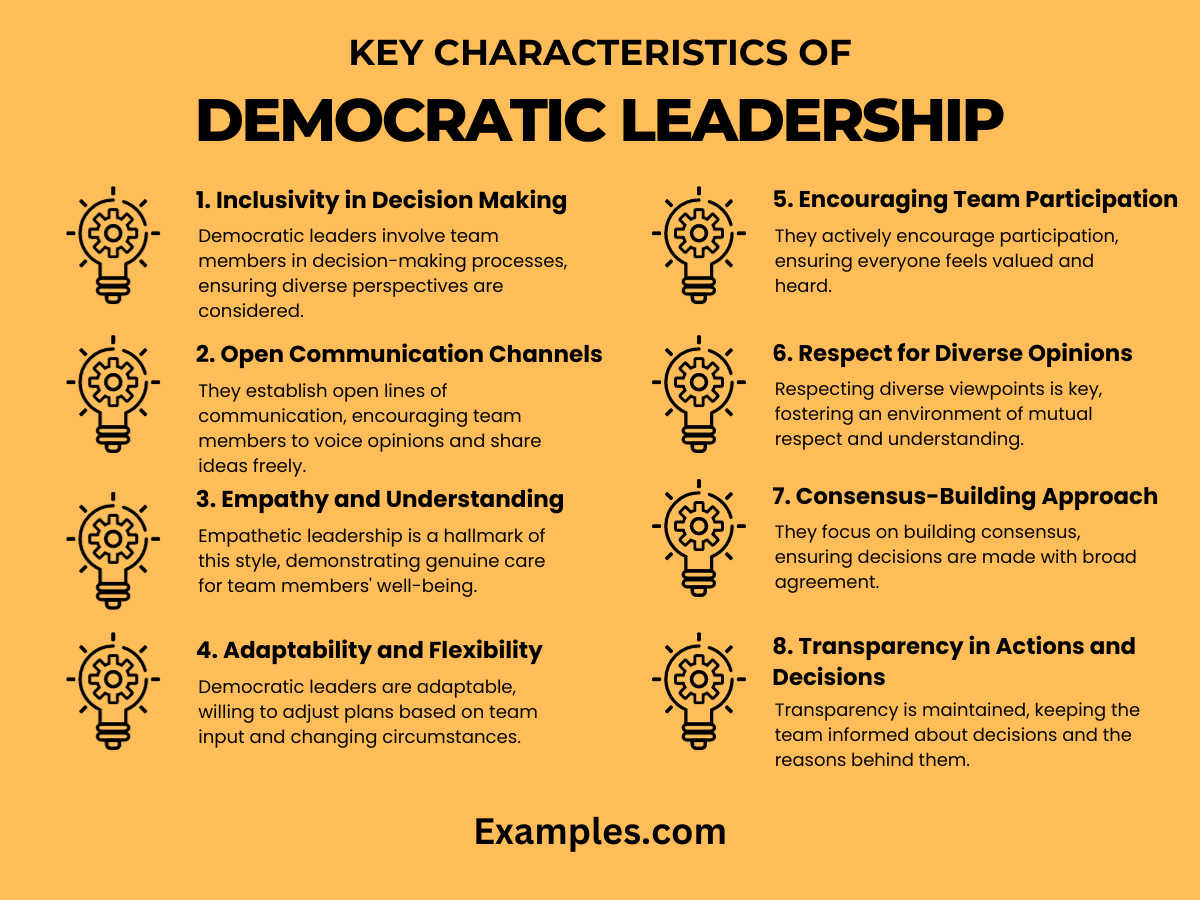29+ Communication Skills of a Democratic Leader Examples
Delve into the world of democratic leadership with our comprehensive guide, highlighting the pivotal Communication Skills of a Democratic Leader. This guide is enriched with practical communication examples, illustrating how democratic leaders can effectively inspire, guide, and collaborate with their teams. Enhance your leadership repertoire with proven techniques and examples, tailored to empower leaders in fostering an inclusive and productive environment. Discover the art of democratic communication to lead with confidence and empathy.
30 Communication Skills of a Democratic Leader Examples
Democratic leadership is rooted in open dialogue, mutual respect, and collaborative decision-making. This comprehensive guide highlights 30 distinct examples of communication skills of a democratic leader. These skills are essential for creating a work environment where each team member feels empowered and heard, fostering innovation and collective success. The ability to engage in active listening, articulate ideas clearly, and maintain transparency are hallmarks of an effective democratic leader.

- Encouraging Team Feedback: Actively seeks and values input from all team members, creating a culture of shared ownership and open dialogue.
- Open-Ended Questioning: Uses questions that promote deeper thinking and discussion, encouraging team members to explore and share more nuanced insights.
- Empathetic Listening: Demonstrates genuine understanding and empathy towards team members’ ideas, fostering a supportive and inclusive atmosphere.
- Clear and Transparent Communication: Ensures all team members are well-informed about decisions and processes, promoting a culture of trust and transparency.
- Mediating Conflicts: Employs conflict resolution skills to ensure disputes are resolved fairly and respectfully, maintaining team harmony.
- Promoting Diversity of Thought: Encourages and values a wide range of viewpoints and ideas, driving innovation and preventing groupthink.
- Consensus Building: Strives for collective agreement in decision-making, ensuring each team member feels their opinion matters.
- Providing Constructive Feedback: Offers feedback that is focused on growth and development, fostering a positive learning environment.
- Facilitating Team Meetings: Conducts meetings that are interactive and collaborative, allowing every participant to contribute meaningfully.
- Acknowledging Contributions: Regularly recognizes the efforts and achievements of team members, enhancing morale and motivation.
- Setting Clear Goals and Expectations: Communicates organizational objectives clearly, aligning the team’s efforts with overarching goals.
- Adapting Communication Style: Tailors communication to suit individual team members’ styles, ensuring effective and personalized interactions.
- Encouraging Creative Solutions: Motivates team members to think creatively and propose innovative solutions to challenges.
- Showing Appreciation and Recognition: Demonstrates gratitude for team members’ hard work, reinforcing a culture of appreciation and respect.
- Hosting Collaborative Sessions: Leads brainstorming and collaborative sessions to harness the team’s collective wisdom and creativity.
- Effective Non-Verbal Communication: Utilizes positive body language to reinforce messages and create an open and approachable atmosphere.
- Regular Progress Updates: Keeps the team informed about developments, fostering a sense of involvement and collective progress.
- Two-Way Communication: Engages in genuine dialogues, encouraging feedback and discussion from team members.
- Personalized Communication: Engages with team members on an individual basis, acknowledging their unique contributions and perspectives.
- Handling Feedback Constructively: Receives and acts on feedback from the team, demonstrating a commitment to continuous improvement.
- Promoting a Positive Team Environment: Cultivates a workplace where open and respectful communication is the norm.
- Inclusive Decision Making: Involves team members in decisions, enhancing their commitment and sense of belonging.
- Empowering Team Members: Encourages autonomy and initiative, allowing team members to lead aspects of projects or tasks.
- Addressing Team Concerns: Attentively listens to and addresses issues raised by team members, ensuring a supportive work environment.
- Encouraging Self-Expression: Fosters a space where team members can freely express their thoughts and ideas.
- Cultural Sensitivity: Respects and incorporates diverse cultural perspectives, enriching team interactions and understanding.
- Active Engagement in Discussions: Participates actively in team discussions, showing interest and valuing each member’s input.
- Strategic Messaging: Communicates with a focus on aligning team efforts with organizational strategies and goals.
- Building Trust Through Honesty: Prioritizes honesty in all communications, establishing a foundation of trust within the team.
- Leading by Example: Models exemplary communication practices, setting a standard for the team to emulate.
Democratic Leadership Advantages and Disadvantages
In this comprehensive guide, explore the advantages and disadvantages of democratic leadership through a detailed table format. This format effectively contrasts the positive and negative aspects, offering a clear understanding of how democratic leadership operates. The focus on communication skills is crucial, as they play a pivotal role in maximizing the benefits and mitigating the drawbacks of this leadership style.

| Aspect | Advantages of Democratic Leadership | Disadvantages of Democratic Leadership |
|---|---|---|
| Decision Making | Encourages diverse viewpoints leading to well-rounded and informed decisions. | Can lead to slower decision-making due to the need for consensus. |
| Team Morale | Boosts morale by valuing each member’s input, increasing job satisfaction. | Potential for conflict due to differing opinions within the team. |
| Creativity | Fosters a creative environment by encouraging open expression of ideas. | Over-collaboration can sometimes dilute the decision-making process. |
| Employee Engagement | Enhances engagement and loyalty by involving team members in the decision-making process. | Requires significant time and resources for discussions and meetings. |
| Trust Building | Builds trust through transparency and open communication. | Dependence on the leader’s ability to effectively manage and balance diverse opinions. |
| Conflict Management | Democratic leaders are typically effective in managing conflicts through communication. | Risks of mismanagement in conflicts due to the diverse viewpoints and interests. |
| Adaptability | Can adapt to various situations by considering multiple perspectives. | Challenges in implementation in large, complex organizations due to varied opinions. |
| Resource Utilization | Utilizes team members’ strengths by allowing them to contribute to their fullest potential. | Can be resource-intensive, demanding more effort in aligning team members’ perspectives. |
| Motivation | Increases motivation by involving employees in goal setting and decision-making processes. | The need for constant involvement can sometimes lead to decision fatigue among team members. |
| Leadership Pressure | Reduces pressure on a single leader by distributing responsibilities. | High demand on the leader’s communication and negotiation skills to balance differing opinions. |
Key Characteristics of Democratic Leadership
Explore the essential traits that define Democratic Leadership. This detailed guide focuses on the unique qualities that make a democratic leader effective and respected. With an emphasis on collaboration, empowerment, and open communication, understand how these leaders inspire trust and foster a positive team environment. From decision-making to conflict resolution, discover how democratic leadership impacts organizational success.

- Inclusivity in Decision Making: Democratic leaders involve team members in decision-making processes, ensuring diverse perspectives are considered.
- Open Communication Channels: They establish open lines of communication, encouraging team members to voice opinions and share ideas freely.
- Empathy and Understanding: Empathetic leadership is a hallmark of this style, demonstrating genuine care for team members’ well-being.
- Adaptability and Flexibility: Democratic leaders are adaptable, willing to adjust plans based on team input and changing circumstances.
- Encouraging Team Participation: They actively encourage participation, ensuring everyone feels valued and heard.
- Respect for Diverse Opinions: Respecting diverse viewpoints is key, fostering an environment of mutual respect and understanding.
- Consensus-Building Approach: They focus on building consensus, ensuring decisions are made with broad agreement.
- Transparency in Actions and Decisions: Transparency is maintained, keeping the team informed about decisions and the reasons behind them.
- Continuous Feedback and Improvement: They prioritize continuous feedback, both giving and receiving it for team growth and development.
- Accountability and Responsibility Sharing: Democratic leaders share responsibility and accountability, promoting a sense of ownership among team members.
Analyze the Importance of Excellent Communication Skills to a Democratic Leader
In this section, delve into why excellent communication skills are vital for a democratic leader. Understand how effective communication fosters transparency, encourages participation, and builds trust within a team. This analysis highlights how a democratic leader’s ability to articulate, listen, and negotiate is central to their success, impacting everything from team cohesion to decision-making efficiency. Discover the transformative power of communication in democratic leadership, illustrating its significance in shaping an open and collaborative work environment.
- Fostering Open Dialogue: A democratic leader excels in creating an open dialogue, encouraging team members to voice their opinions freely.
- Building Team Trust: Effective communication builds trust, making team members feel valued and heard.
- Enhancing Decision-Making: Clear communication enhances the decision-making process, ensuring all viewpoints are considered.
- Preventing Misunderstandings: Skillful communication prevents misunderstandings, a crucial aspect in a collaborative environment.
- Encouraging Participation: Leaders who communicate well encourage greater participation from team members.
- Managing Conflicts: Strong communication skills are essential for managing conflicts effectively in a team.
- Promoting Transparency: Transparent communication promotes a culture of honesty and openness, which is key in democratic leadership.
- Balancing Diverse Opinions: A democratic leader uses communication to balance diverse opinions and form a coherent direction.
- Motivating and Inspiring: Excellent communication skills are used to motivate and inspire team members, driving them towards common goals.
- Building Consensus: Effective communication is crucial for building consensus among team members, ensuring everyone is on the same page.
Which Communication Method is Adopted in Democratic Style of Leadership?
The democratic style of leadership is characterized by its collaborative, participative, and inclusive approach, with communication playing a pivotal role. This leadership style primarily adopts open and two-way communication methods, fostering an environment where every team member feels valued and heard. The key is in facilitating dialogues that encourage diverse opinions and collective decision-making.
- Open Forums and Meetings: Regular meetings where all team members are encouraged to voice their opinions and contribute to discussions.
- Feedback Mechanisms: Implementing structured feedback systems where employees can share their thoughts and suggestions openly.
- Group Discussions: Encouraging group discussions to brainstorm and solve problems collaboratively, respecting each person’s viewpoint.
- Digital Communication Platforms: Utilizing digital tools like email, messaging apps, and project management software for constant and transparent communication.
- Town Hall Meetings: Organizing larger, informal gatherings like town hall meetings to discuss broader organizational goals and strategies.
- Surveys and Polls: Using surveys and polls to gather opinions and preferences from team members, ensuring everyone’s voice is considered.
- One-on-One Conversations: Regular individual meetings to understand personal perspectives and provide tailored support.
What are Skills Required for the Democratic Leadership?
In the realm of leadership styles, democratic leadership stands out for its collaborative, inclusive approach. Essential to this style are key communication skills and attributes that enable a leader to effectively manage a diverse team while fostering an environment of mutual respect and shared decision-making. Understanding and cultivating these skills can significantly enhance the effectiveness of a democratic leader.
Strong Communication Skills
The cornerstone of democratic leadership is excellent communication. This involves not just conveying information clearly but also being an active listener. It’s about creating a dialogue where every team member feels heard and valued. Effective communication fosters transparency and trust, essential in a democratic setting.
Active Listening
Active listening is crucial for understanding team members’ perspectives and concerns. It involves fully concentrating, understanding, responding, and then remembering what is being said. This skill helps in making informed decisions that consider the team’s collective insights.
Empathy and Emotional Intelligence
Empathy, a critical component of emotional intelligence, allows democratic leaders to connect with their team members on a deeper level. Understanding and sharing the feelings of others helps in building strong, respectful relationships, crucial for team cohesion and morale.
Decision-Making Skills
While democratic leaders involve their team in the decision-making process, they also need to have strong decision-making skills themselves. This involves analyzing all aspects of a situation, considering team inputs, and making decisions that align with the team’s and organization’s goals.
Ability to Build Consensus
A democratic leader excels in building consensus among diverse team members. This skill is about finding a common ground, balancing different viewpoints, and steering the team towards a shared decision that everyone supports.
Adaptability and Flexibility
The dynamic nature of democratic leadership requires leaders to be adaptable and flexible. They need to be open to changing plans and strategies based on team inputs and evolving situations.
Delegation Skills
Delegation is a key aspect of democratic leadership. It involves entrusting tasks or responsibilities to team members, which not only lightens the leader’s load but also empowers team members, boosting their confidence and skill sets.
Conflict Resolution
Democratic environments can lead to conflicts due to diverse viewpoints. Effective conflict resolution skills are essential for maintaining harmony and keeping the team focused on common goals.
Inspirational and Motivational Abilities
A democratic leader must be able to inspire and motivate their team. This involves encouraging team members, recognizing their efforts, and keeping them aligned with the organization’s vision and goals.
Cultural Sensitivity
In today’s global work environment, cultural sensitivity is vital. Understanding and respecting cultural differences ensures that all team members feel included and respected.
As we conclude our exploration of Communication Skills of a Democratic Leader, it’s evident that these skills are not just about managing teams but about inspiring and uniting people towards a common goal. A democratic leader’s ability to listen actively, provide empathetic feedback, and foster an environment of open dialogue and mutual respect is crucial. This leadership style, characterized by inclusivity and collaboration, empowers individuals, encourages diverse perspectives, and strengthens team cohesion.
For further insights into democratic leadership and its application in various contexts, the Harvard Business Review offers a wealth of resources. Their articles, such as “The Big Idea: Leadership in the Age of Transparency”, provide in-depth analysis and case studies on how transparency and communication shape effective leadership. Additionally, the American Psychological Association (APA) provides resources on leadership and organizational psychology, such as their workplace psychology resources, which delve into the psychological aspects of leadership and communication in professional settings. These external resources complement the skills outlined in our guide, offering broader perspectives and practical applications in the field of democratic leadership.



